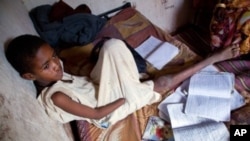A U.S.-based group of physicians on Tuesday released medical evidence of widespread torture, sexual assault and other human rights violations against civilians in Sudan's conflict-wracked Darfur region.
The study was released by the group Physicians for Human Rights in the peer-reviewed Internet medical journal, PLoS Medicine.
The report is based on the work of forensic medical experts who reviewed the records of more than 300 Darfuri patients who fled violence from more than 20 rural areas across Darfur. They were examined between 2004 and 2006 at a clinic in Nyala, South Darfur.
Despite the passage of time and the narrowness of the study, co-author Alexander Tsai, a physician at Harvard University, says it helps define what has been happening in Darfur.
"We do know that people have resisted calling what has been going on by various names, whether you want to call it war crimes or genocide or crimes against humanity," said Tsai. "One of the reasons why this semantic game has been permitted to persist is that we really have not had a whole lot of evidence."
Hostilities in the region escalated with the start of a massive rebel insurgency in 2003. The report says the atrocities were committed by Sudan government forces and allied Janjaweed tribal fighters against non-Arab speaking populations.
The report says atrocities range from beatings and gunshot wounds to sexual assaults.
Nearly half of all of the women reported being sexually assaulted. Half of the sexual assaults were reported to have taken place in close proximity to displacement camps, where victims had sought shelter after fleeing the violence.
Sudanese officials repeatedly have denied that large-scale and intentional abuses are being committed against civilian populations. They say security forces are countering attacks by rebel groups and that the number of dead and the reported abuses are exaggerated by those trying to undermine the Khartoum government.
Although not in custody, Sudan's President Omar al-Bashir, former humanitarian affairs minister Ahmed Mohammed Haroun and Janjaweed militia leader Ali Kushayb face war crimes charges at the International Criminal Court.
Alexander Tsai of the Physicians for Human Rights says he hopes the new evidence will reduce what he calls the "wiggle room" for counter-claims and help in the pursuit of justice.
"We really need hard facts to be brought to bear on this issue and to stop the violence," said Tsai. "This is the only study so far where forensic analysis has been applied to medical records. We really are hoping that this analysis will be used to bring the bad guys to account for their actions."
Despite repeated attempts at peace negotiations, violence similar to what was documented in the study has been ongoing in Darfur as well as in South Kordofan and Blue Nile states, where rebels and government forces are also fighting.
News
US Physicians Group Offers Evidence of Darfur Atrocities




